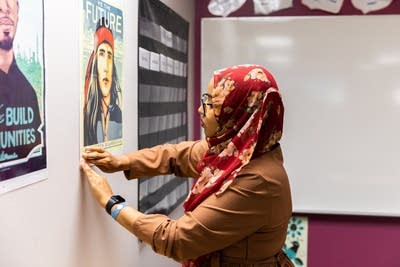Future of Us: What's next for education in Minnesota?

Go Deeper.
Create an account or log in to save stories.
Like this?
Thanks for liking this story! We have added it to a list of your favorite stories.
This story is part of a series called “The Future of Us,” exploring how a pandemic, a murder and a city on fire have changed us and our path forward.
When the COVID pandemic hit, Qorsho Hassan was teaching fifth grade in Burnsville, Minn. As the coronavirus ravaged the nation, Hassan looked for ways to meet the shifting needs of her students. Amid the crisis, she saw an opportunity for reimagining education.
Her innovative approach got noticed. Hassan would become Minnesota’s 2020 Teacher of the Year — and the state's first Somali teacher to earn the honor. But then, in a surprise to many, she decided to leave the classroom entirely.
“Right away as a pandemic began, there was an increase or an uptick in parent communication … and also really centering basic human needs first,” she said.
Turn Up Your Support
MPR News helps you turn down the noise and build shared understanding. Turn up your support for this public resource and keep trusted journalism accessible to all.
In this shift, Hassan glimpsed a new reality for classrooms: a student- and parent-centered approach to education that she calls “co-design.”
Then George Floyd was murdered, and schools, like many institutions, began examining their Diversity, Equity and Inclusion (DEI) policies. Again, Hassan saw an opportunity to make system-wide changes that would better serve students.
“I saw a lot of schools share their DEI mission statements, share a lot of visioning in terms of how to build more, you know, equitable school spaces for students.”
But as time went on, the changes for which Hassan had hoped didn’t materialize. She decided that to create the educational experience she envisioned for students in Minnesota, she would need to do it from the outside in.
She left teaching to join Thrive Ed, an organization that aims to address Minnesota’s long-standing racial education gap.
“Thrive Ed became my refuge and it became my safe space when I really needed some way to escape my reality of dealing with emergency distance learning and then the height of COVID-19, and then on top of that, the murder of George Floyd.”
Now, as the Executive Director of Thrive Ed, she is working with the Hopkins school district to model the kind of student-led and student-centered learning environment that, if better supported, might have kept Hassan in the classroom.
“I want our community to decide what education looks like. I think that if we move towards that direction and have more of a practice of youth-led spaces, not just for education but really in all sectors, I think we'll have a better world.”
To hear the full conversation with Qorsho Hassan, click play on the audio player above.
Dear reader,
Political debates with family or friends can get heated. But what if there was a way to handle them better?
You can learn how to have civil political conversations with our new e-book!
Download our free e-book, Talking Sense: Have Hard Political Conversations, Better, and learn how to talk without the tension.






